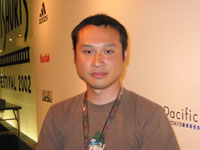 |
|
 |
|
Yoshihiro Noda has worked as an actor on the stage, in television and in films. He took a year off to
learn the art of filmmaking, after which he made "an encounter like..." He talked about the differences
between working in front of the camera and behind it. "When you're an actor, can't do your work alone. You have to have a script, you have to take directions from a director, and you depend a lot on how you work with the people around you. On the other hand, there is a side of being a director that's totally different, where you start from zero and go from there. And that's how [a director] can end up making his own works, realizing his own vision. At least, that's how I see it." As for choosing one role over the other, Noda hasn't really decided yet. "It would be great to pursue both acting and directing at the same time, and let one of them choose me," he half-jokes. "For now, though, neither is my main thing yet. I've been acting a lot longer, so that could just be my main career, but ideally, I'd like to act and direct at the same pace." We just had to ask Noda if the story in "an encounter like…" is based on a personal experience. "Not at all. It doesn't resemble anything I've ever experienced. However, I wanted to make a story whose main idea was easy to grasp, so that's how I approached it. A lot of people who have seen it have told me they thought it was a very interesting story, but the strange thing is that mostly women have said this to me. I wonder if there's something in there that resonates only with women," he jokes. Noda's film is one of just a few Japanese films in the 54 total in this year's SSFF. Does he think that films and nationality are connected? "I think that's a tough question. Actually, I think there definitely is a connection. A filmmaker's culture is his backbone, and you feel that consciousness come out in their work. For example, if you watched an American and an Indian film with the same story, and they both had music and dancing scenes in them, they would still end up being completely different. However, I think it's precisely those differences that make them so interesting. So, yes, films and nationality are definitely related. I don't think that means that one work is necessarily better than the other, but rather, it's those differences that I really enjoy. In the end, though, I think the real issue of nationality in film is when you just ride past that whole issue of nationality, and you just enjoy the ride, that is, the film, the story." We asked Noda what kind of advice or message he might have for budding filmmakers. "I don't have anything really earth-shattering to tell other filmmakers, but, especially where short films are concerned, I'd love to see people make more. I think there are a lot of people who want to make feature-length films, but there are too few making short films. In France, one of the major annual events is the (Clermont-Ferrand) short film festival, and it would be nice to have something like that here. And recently a lot of mini-theaters have opened up here and there, where I think short filmmakers could take their works and show them, and establish a precedent for other short filmmakers. All I can say is it would be nice to see more filmmakers take a strong direction and work together. That's what I'm going to do." |